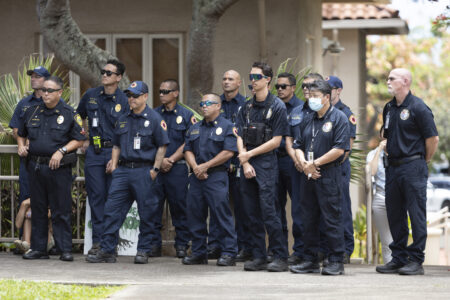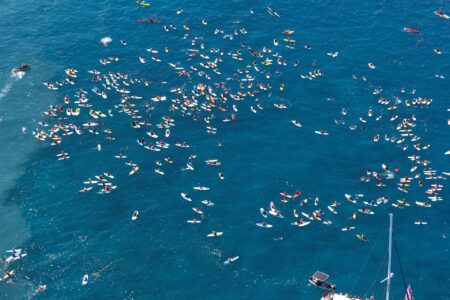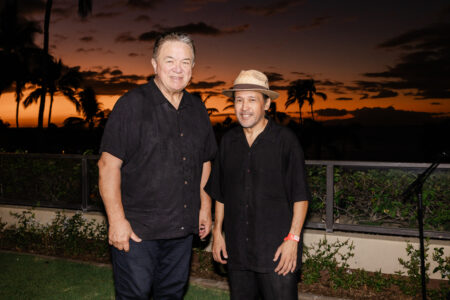Rogers takes his ‘responsibility’ as only neurosurgeon on Maui seriously

Dr. Thomas Rogers is pictured in his Kahului office last week. Rogers, 74, is the only neurosurgeon currently practicing on Maui. The Maui News / CHRIS SUGIDONO photo
Dr. Thomas Rogers has been on call 24/7 for the past two decades as the only neurosurgeon on Maui.
“I think I’ve left Maui three days total since I’ve been here,” Rogers said leaning back in his office chair Thursday in Kahului. “I feel I have a responsibility.”
The 74-year-old has conducted 1,000 to 2,000 spinal surgeries and hundreds of brain surgeries since he moved to the island with his family in 1998. Rogers carefully reviews all head trauma and nearly all neck injuries admitted at his private practice and Maui Memorial Medical Center.
While Rogers cut back his practice several years ago and only does consultations as well as routine surgeries now, he does not appear interested in retirement. He said he is committed to stay and help incoming hospital operator Kaiser Permanente-affiliated Maui Health System find a replacement for him and possibly an additional neurosurgeon.
“I’m not ready to throw in the towel yet,” Rogers said. “I’m going to help with this transition as much as I can.”
Finding a neurosurgeon and recruiting him or her to move to the island isn’t easy. Rogers said he left Orlando Regional Medical Center in Florida, one of the largest tertiary hospitals in the country, to come to Maui at the urging of his brother and wife. His brother worked many years as an emergency room physician in Kona and his wife was an emergency room nurse.
“They told me that there was an opportunity to practice here and my wife likes Hawaii. We all answer to a higher authority,” Rogers said with a smile.
His predecessors, including Dr. Roger Slater, showed him the ropes on the island and helped get him settled. It was not long before he began performing the first brain surgeries ever on Maui.
“I’ve seen thousands and thousands of patients,” Rogers said. “A lot of times, I’ll be in the store, and they’ll say hello to me.”
A neurosurgeon determines a diagnosis and surgically treats disorders of the central and peripheral nervous system, according to the University of Rochester Medical Center. This includes trauma, tumors, vascular disorders, infections of the brain or spine, stroke and degenerative diseases of the spine.
It takes an extensive and rigorous process to become a neurosurgeon starting with four years of college, four years of medical school, a one-year internship in general surgery, five to seven years in a neurosurgery residency program and continual education to keep up with advances in the field, according to the university.
“They say all neurosurgeons are crazy,” Rogers joked. “The question is are they crazy to begin with or did they become crazy.”
Maui does not get as many complex and disastrous injuries as Orlando or Newport Beach, Calif. — where Rogers worked for 20 years — but he sees a fair amount of life-threatening injuries from water and traffic accidents. Rogers said he sees 10 to 20 patients a day at his office and sometimes up to five or six patients at the hospital.
“There’s certain things where time is of the essence and you need to fix them within a few hours or else someone will be paralyzed or die,” he said.
Rogers recalled both heartwarming and heartbreaking stories of patients he has treated over the years. He said one boy fractured and bruised his spinal cord after getting hit by a wave on a visit to Maui for his 18th birthday and graduation present.
Rogers fused his spine back together and the boy sent him a video of himself walking across the stage to receive his diploma.
“He was very lucky. Others are not so lucky,” he said. “We’ve had people who were like Christopher Reeve, where they have a high fracture and they can’t breathe. They’re on a ventilator and everything. That’s why certain things you never get used to seeing, especially when young people get injured.”
Rogers called himself a “docosaurus” and said he has done some surgeries so many times “I can almost literally do them in my sleep.” He said 90 percent of the time it’s easy to determine whether someone needs surgery or not, but there always exists a “gray zone.”
“Ten percent of the time you’re dealing with a gray zone that you don’t really know what to do,” he said. “I’ll see things I’ve never see sometimes. Certain brain problems are very, very rare and occur one in a million population.”
A strange injury Rogers has only seen since coming to Hawaii is surfer’s myelopathy — a rare nontraumatic paraparesis. Beginner surfers lie on a board, stand up and gradually lose the use of their legs until they become paralyzed, he said.
“Half of them get better and half of them don’t,” Rogers said. “I’ve seen 24 of these . . . We had one doctor here walk off the beach and never walk again. Somehow it must interfere with the circulation of the spinal cord. Hard to believe isn’t it?”
Rogers said he gets called at all hours of the night for emergencies and lives only one to two minutes away from the hospital. He said imaging software and doctors telling him the condition of the patient help to reduce his trips to the emergency room.
His greatest skill, though, might be his ability to answer a call, make decisions and go back to sleep.
“You get tired at times, and everybody gets tired at times, but when somebody is really sick the adrenaline starts pumping in you,” he said.
Maui Health System is set to take over Maui Region public hospitals July 1, and it plans to help Rogers by increasing neurological services and hiring more assistants. Rogers said that the Kaiser-affiliated nonprofit’s head of neurosurgery visited the island several months ago, and Maui Health officials are committed to keeping as many neurological cases on the island as possible.
“I want people to understand that Kaiser has truly made an effort to get people to come here,” he said.
Neurosurgeons make from $300,000 to $1 million a year, but overhead costs can be up to 50 percent, Rogers said. The biggest obstacles to recruiting a doctor to Maui are new physicians being away from family, unaccustomed to the culture and getting “island fever,” he said.
“I say it’s a wonderful place, and people are very appreciative of being cared for over here,” he said. “You’ll come in, and I’ve never seen where somebody is sick and there will be 40 to 50 people come in concerned about him. I’ve never seen that anywhere else.”
Rogers said many exams and decisions need to be done by a neurosurgeon, which is the vast majority of his work. He said a large number of patients also have altered mental states that can factor into his judgment.
“There’s an old saying, ‘You don’t operate on pictures, you operate on patients,'” he said. “There’s certain guidelines you can go on like, if a blood clot is a certain size, chances are they need surgery.
“But there’s still that judgmental factor.”
Although Rogers makes the final decisions, he dislikes the phrase “lone neurosurgeon.” He praised the staff at Maui Memorial, the first hospital in the state capable of treating a stroke victim at anytime by using a catheter to remove a blood clot in the brain.
“Medicine is a team effort, and there’s no way I could do this without the help of others,” he said.
Rogers said he plans to retire sometime in the next two to five years.
“I’ve done a lot of things in life,” he said. “I’ve done a lot of traveling and probably played enough golf for 10 lifetimes. I enjoy doing what I’m doing. I don’t consider it work really.”
• Chris Sugidono can be reached at csugidono@mauinews.com.
- Dr. Thomas Rogers is pictured in his Kahului office last week. Rogers, 74, is the only neurosurgeon currently practicing on Maui. The Maui News / CHRIS SUGIDONO photo





